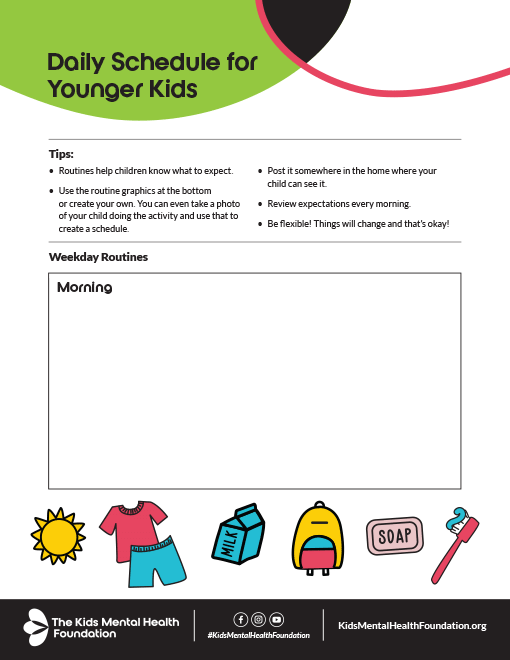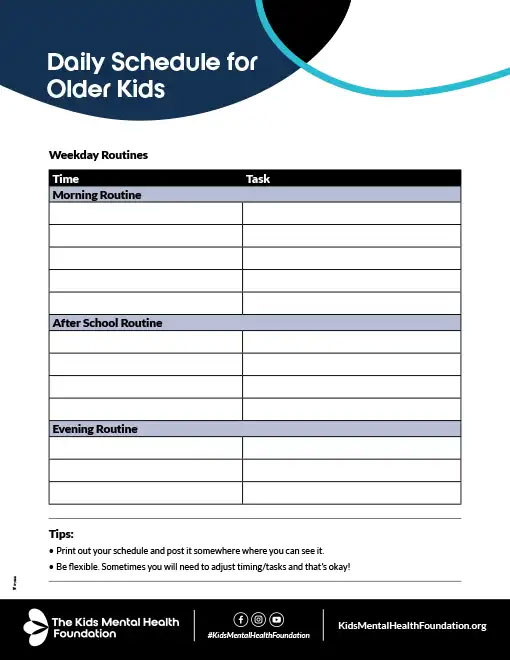-
Acknowledge and Discuss Differences: When children notice developmental differences, engage in open conversations that highlight both similarities and differences, fostering empathy and understanding.
-
Encourage Inclusive Interactions: Support your child in forming relationships with peers of diverse abilities to promote acceptance and reduce biases.
How Routines Help Kids' Mental Health
Article Summary
- Routines help kids feel safe and build independence.
- Having regular routines can also help reduce conflict and power struggles.
- Adding routines to your life doesn’t have to be complex. You can start today and build on them over time.
Young children often beg for repetition—reading the same book over and over or wanting to wear the same t-shirt for a week. Repetition, in the form of routines, has many mental health benefits for children, decreasing stress and helping kids handle emotions. Even teens and adults experience mental health benefits from having routines.
1. Routines Help Children Feel Safe. Routines help us know what to expect from a situation, which helps us feel in control and can decrease feelings of anxiety. For young children, routines are particularly helpful around times of separation such as leaving a child at a babysitter’s or tucking them in to bed at night.
2. Routines Help Children Build Independence. When children get used to following the same set of steps over and over again, they are more able to do these steps on their own which builds a sense of mastery and confidence. Routines can be particularly helpful around everyday tasks such as getting ready for school in the morning or getting ready for bed at night. Parents can take advantage of the power of routines by giving their children clear steps for getting tasks done. This gives the added benefit of parents feeling more confident in their skills!
3. Routines Can Decrease Power Struggles. When children have consistent and predictable routines, they are more likely to do what is expected of them. Instead of a parent needing to tell a child over and over what needs to happen next, the routine becomes a part of everyday life. For example, having the routine of doing homework after school each day will likely decrease the need for a parent to remind their teen and get into arguments.
Here are some ideas to get you started:
- Set a schedule. Try to keep a similar schedule every day. For example, same wake up and bedtime, same mealtimes, and similar times for homework and activities. As children get older, encourage them to have a say in their schedules. Download our schedule templates to get started.
- Create steps. Creating routines doesn't have to be complicated. Think about something you already do every day with your child (mornings before school, bedtime, dinner) and break it down into small steps. Then follow those steps in the same order each time!
- Create a visual with pictures for younger kids and lists for older kids to help outline a specific routine or schedule. This helps them follow along with what happens next and take ownership. Take a look at our downloads to help you get started!
- Discuss changes. We know flexibility has to happen at times, so don’t stress if some days look different! Let your child know ahead of time what to expect if there is a change happening to your usual routine.
Remember, all new habits take practice, including new routines. Sometimes we also have to make adjustments and changes to make it work. Just remember, we know the long-term benefit in emotion regulation and behavior is worth it!
References
Bridley A. Jordan S S. (2012). Child routines moderate daily hassles and children's psychological adjustment. Children's Health Care, 41(2), 129-144.
Harrist A W. Henry C S. Liu C. Morris A S. (2019). Family resilience: The power of rituals and routines in family adaptive systems. In B. H. Fiese, M. Celano, K. Deater-Deckard, E. N. Jouriles, & M. A. Whisman (Eds.), APA handbook of contemporary family psychology: Foundations, methods, and contemporary issues across the lifespan (pp. 223–239). American Psychological Association.
Larsen K L. Erp L A. Jordan M. Jordan S S. (2021). Bedtime routines of young children, parenting stress, and bedtime resistance: mediation models. Child Psychiatry & Human Development, 1-9.
 Copy Link
Copy Link





